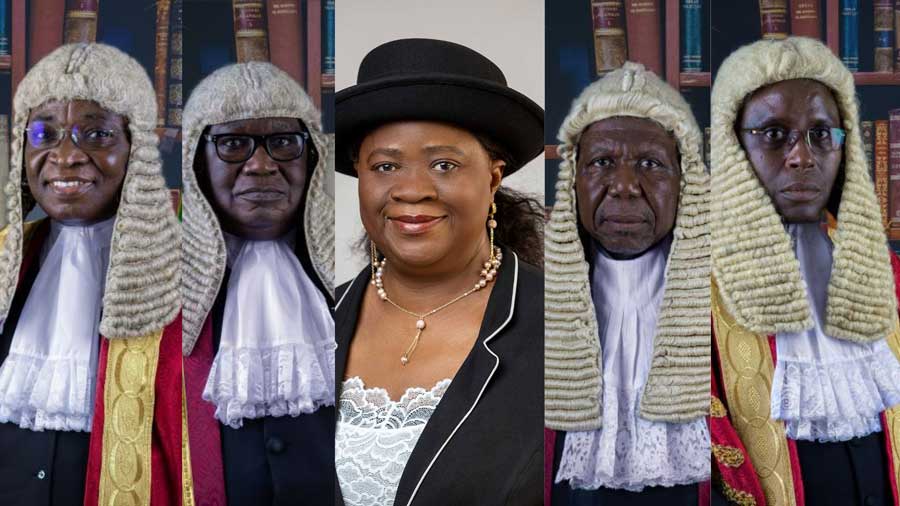JUST IN: Appeal Court Confirms THE WHISTLER Report On 5 Judges To Determine Obi, Atiku’s Presidential Petitions
The Presidential Election Petition Tribunal sitting at the Court of Appeal in Abuja on Monday has inaugurated a five-man panel that will determine all petitions challenging the outcome of the 2023 Presidential Election.
THE WHISTLER had exclusively gathered from an official familiar with developments within the Court of Appeal and the National Judicial Council (of which the Court of Appeal president is a member), that the panel of judges that had already begun sitting on motions-ex parte earlier filed by respective petitioners are most likely to be retained to continue presiding over the case when pre-hearing and full hearing sessions begin at the PEPT.
Advertisement
THE WHISTLER had also reported that since the five-man panel of the 2019 PEPT were seniors in the appellate court at the time (most of whom have retired after proceeding to the Supreme Court), most senior judges of the Appeal Court will be selected to the panel.
This website reported Justices Haruna Simon Tsammani, Stephen Adah, Abah Mohammed would be part of the 2023 panel.
Corroborating THE WHISTLER findings at the open court, Haruna Simon Tsammani announced himself as the presiding justice of the panel.
He also announced Justices Stephen Adah, Abah Mohammed as members of the panel including Bolaji Yusuf and J.U. Ugo.
Advertisement
Below are the profile of the judges:
JUSTICE HARUNA SIMON TSAMMANI
Tsammani (64) from Bauchi state was appointed to the Court of Appeal on 16th July 2010. He served as the Chairman of the three-man panel that granted Obi and Atiku’s motions to serve Tinubu their petitions by substituted means. He graduated from the Nigerian Law School, Lagos in 1983 and started out as High Court judge, in Bauchi state on 17th September 1998.
Tsammani has presided over various election and financial matters as a judge.
One of those cases is a petition filed by the former Governor of Oyo State, Abiola Ajimobi, challenging the judgment of the 2019 Election Petition Tribunal which had on November 19 same year upheld PDP’s Kola Balogun as the winner of the senatorial election for Oyo South held on February that year.
Advertisement
Balogun was said to have polled a total of 105,720 votes to defeat Ajimobi who garnered 92,218 votes but the latter disagreed and approached the Court of Appeal in Ibadan for redress.
Ajimobi based his petition on the allegation that his PDP counterpact was not qualified to represent his party at the election.
But Justice Haruna Tsammani who prepared the lead judgment dismissed Ajimobi’s petition for lacking in merit, holding that a person who was not part of a political party has no right to challenge the outcome of its primary election.
STEPHEN JONAH ADAH
Adah (66) served as a member of the three-man panel that granted Obi and Atiku’s motions to serve Tinubu their petitions by substituted means. He is from De-Kina LGA of Kogi State. He passed out from the Nigerian Law School in 1982 and became a Federal High Court judge on November 12, 1998 prior to his promotion to the Court of Appeal on November 5, 2012.
Adah has passed verdicts on several cases and one of his landmark decision was in the appeal filed by the Economic and Financial Crimes Commission in 2020 against a trial court’s decision which partially upheld the no-case submission filed by former President Goodluck Jonathan’s cousin, Robert Azibaola.
Advertisement
The antigraft agency had instituted $40 million money laundering charges against him.
But Adah dismissed the appeal saying EFCC could not prove the allegation beyond reasonable doubt.
“The trial court was in order to discharge and acquit Azibaola and his company in counts 1,4,5,6,7,8 and 9 because offences of money laundering were not sufficiently proved, nor did the prosecution establish any prima facie case against the respondents.
“We have gone through the records and found that the appeal is lacking in merit, the appeal is hereby dismissed and the Judgment of the lower court upheld”, Mr Adah said.
ABBA BELLO MOHAMMED
Mohammed (62) from Kano State was part of the three-man panel that granted Obi and Atiku’s motions to serve Tinubu their petitions by substituted means.
He finished the Nigerian Law School in 1985 and was appointed as a judge of the High Court of the FCT in 2010. After serving for about 10 years, he was promoted to the Court of Appeal on the 28th of June 2021.
Justice Mohammed presided over the Nasarawa State Governorship Election Tribunal in 2019.
The PDP governorship candidate in the 2019 general election, Hon. David Emmanuel Ombugadu had sued INEC and Governor Abdulahi Sule of the All Progressive Congress (APC).
But Justice Mohammed dismissed the petition for lacking in merit and so thereby dismissed, holding that the petition’s allegation of over voting and electoral violence could not be substantiated.
Justice Misitura O. Bolaji-Yusuf
Justice Bolaji (64) who hails from Oyo West, Oyo state, graduated from the Nigerian Law School in 1984 and was appointed to the High Court of Oyo state on January 30, 1997.
After seventeen years of serving at the lower court, she was on March 24, 2014, appointed to the Court of Appeal.
In a particular land dispute in Enugu state , she had once ruled that “An unsigned document is a worthless piece of paper, more so a court a process that the rules of court specifically stipulate shall be signed.”
Justice Boloukuoromo Moses Ugo
Justice Ugo (58) hails from Kolokuma/Opokuma Local Government in Bayelsa State.
He was appointed a judge of the High Court of Bayelsa State on March 21, 2006, and later got promoted to the Court of Appeal on March 24, 2014.



